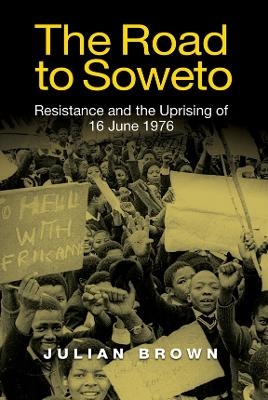
The Road to Soweto
James Currey (Verlag)
978-1-84701-141-1 (ISBN)
This revisionary account of the Soweto Uprising of June 1976 and the decade preceding it transforms our understanding of what led to this crucial flashpoint of South Africa's history. Brown argues that far from there being "quiescence" following the Sharpeville Massacre and the suppression of African opposition movements, during which they went underground, this period was marked by experiments in resistance and attempts to develop new forms of politics that prepared the ground for the Uprising. Students at South Africa's segregated universities began to re-organise themselves as a political force; new ideas about race reinvigorated political thought; debates around confrontation shaped the development of new forms of protest. The protest then began to move off university campuses and onto the streets: through the independent actions of workers in Durban, and attempts by students to link their struggles with a broader agenda. These actions made protest public once again, and helped establish the patterns of popular action and state response that would come to shape the events in Soweto on 16 June 1976.
Julian Brown is a Lecturer in the Department of Political Studies at the University of the Witwatersrand, Johannesburg.
Southern Africa (South Africa, Namibia, Lesotho, Swaziland & Botswana): Jacana
'throws new light on the background to the Soweto Uprising, providing insight into white and black student politics, worker protest and broader dissent' - William Beinart, University of Oxford
'an extremely important contribution to the historiography on protest in South Africa. It links black and white student protests (too often studied in isolation from one another) to workers' movements by looking at the changing forms of protest during the 1960s and 1970s, and the apartheid government's changing responses.' - Anne Heffernan, University of the Witwatersrand
'By showing how the Soweto Uprising served as a precursor for later historical and political events, the author convincingly shows the continuity from one from one protest and decade to the next.' - Dawne Curry, University of Nebraska-Lincoln
JULIAN BROWN is Associate Professor of Political Studies, University of the Witwatersrand. He is author of The Road to Soweto: Resistance and the Uprising of 16 June 1976 (2016) and Marikana: A People's History (2022). He holds a Senior Visiting Research Fellowship at the Max Planck Center, Sciences Po, Paris.
Introduction: The Road to Soweto
White Student Activism in the 1960s: 'The Choice Between Silence and Protest'
The Formation of the South African Students' Organisation: 'Carving Out their Own Destiny'
Confrontation, Resistance and Reaction: 'The Minister... Cannot Ban Ideas from Men's Minds'
The Durban Strikes: 'Souls of their Own'
Reimagining Resistance in the Face of Violence: 'Cast off the Students-only Attitude'
The Pro-Frelimo Rallies of 1974: 'Stand up and be Counted'
Event and Aftermath: The Soweto Uprising
Conclusion: Consequences
| Erscheinungsdatum | 13.04.2016 |
|---|---|
| Verlagsort | Oxford |
| Sprache | englisch |
| Maße | 156 x 234 mm |
| Gewicht | 1 g |
| Themenwelt | Geschichte ► Allgemeine Geschichte ► Zeitgeschichte |
| Geisteswissenschaften ► Geschichte ► Regional- / Ländergeschichte | |
| Geschichte ► Teilgebiete der Geschichte ► Kulturgeschichte | |
| Sozialwissenschaften ► Politik / Verwaltung ► Politische Theorie | |
| ISBN-10 | 1-84701-141-1 / 1847011411 |
| ISBN-13 | 978-1-84701-141-1 / 9781847011411 |
| Zustand | Neuware |
| Haben Sie eine Frage zum Produkt? |
aus dem Bereich


